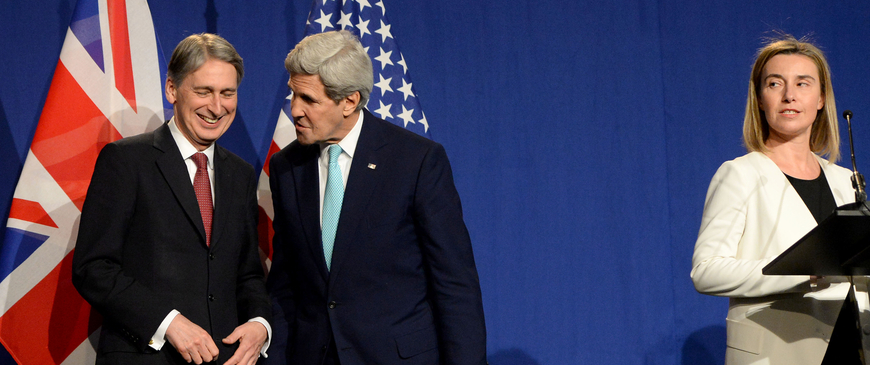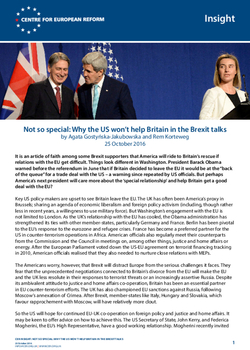
Not so special: Why the US won't help Britain in the Brexit talks
It is an article of faith among some Brexit supporters that America will ride to Britain’s rescue if relations with the EU get difficult. Things look different in Washington. President Barack Obama warned before the referendum in June that if Britain decided to leave the EU it would be at the “back of the queue” for a trade deal with the US – a warning since repeated by US officials. But perhaps America’s next president will care more about the ‘special relationship’ and help Britain get a good deal with the EU?
Key US policy-makers are upset to see Britain leave the EU. The UK has often been America’s proxy in Brussels; sharing an agenda of economic liberalism and foreign policy activism (including, though rather less in recent years, a willingness to use military force). But Washington’s engagement with the EU is not limited to London. As the UK’s relationship with the EU has cooled, the Obama administration has strengthened its ties with other member-states, particularly Germany and France. Berlin has been pivotal to the EU’s response to the eurozone and refugee crises. France has become a preferred partner for the US in counter-terrorism operations in Africa. American officials also regularly meet their counterparts from the Commission and the Council in meetings on, among other things, justice and home affairs or energy. After the European Parliament voted down the US-EU agreement on terrorist financing tracking in 2010, American officials realised that they also needed to nurture close relations with MEPs.
The Americans worry, however, that Brexit will distract Europe from the serious challenges it faces. They fear that the unprecedented negotiations connected to Britain’s divorce from the EU will make the EU and the UK less resolute in their responses to terrorist threats or an increasingly assertive Russia. Despite its ambivalent attitude to justice and home affairs co-operation, Britain has been an essential partner in EU counter-terrorism efforts. The UK has also championed EU sanctions against Russia, following Moscow’s annexation of Crimea. After Brexit, member-states like Italy, Hungary and Slovakia, which favour rapprochement with Moscow, will have relatively more clout.
#America worries that #Brexit will distract #Europe from the serious challenges it faces
So the US will hope for continued EU-UK co-operation on foreign policy and justice and home affairs. It may be keen to offer advice on how to achieve this. The US Secretary of State, John Kerry, and Federica Mogherini, the EU’s High Representative, have a good working relationship. Mogherini recently invited Kerry to address the Foreign Affairs Council, the meeting of all EU ministers of foreign affairs. Kerry might want to explain to Boris Johnson, the UK’s foreign secretary, how to get the UK invited to deliberations of the EU-27, too.
The problem is that the Brexit negotiations will be lengthy and complicated, and restrict Britain’s capacity for foreign policy initiatives. Even David Davis, one of the proponents of Brexit and secretary of state for exiting the EU, warned that “[Brexit] may be the most complicated negotiation of all time” and that the notoriously complex Schleswig-Holstein question was “by comparison … an O-level question”, referring to British school exams that were once taken at the age of 16. The discussions are almost certain to be tense and acrimonious. So far the British government has done little to soothe tensions. Liam Fox, secretary of state for international trade, has alienated EU partners by saying that Britain might use the fate of EU migrants in the UK as a bargaining chip. Some figures in Whitehall have also suggested that the UK could use its military deployments in Eastern European countries as leverage in the negotiations. Since the 2014 NATO summit in Wales, the US has worked painstakingly to get European countries to help deter Russian adventurism on NATO’s eastern flank. The UK has deployed naval ships and fighter aircraft and will deploy 650 troops in Poland and Estonia in 2017. Any hint that the UK might want to cut its contribution if it did not get a good deal from the EU would not go down any better in Washington than in Eastern Europe.
Theresa May told the Conservative party conference in October that she would end freedom of movement and remove Britain from the jurisdiction of the European Court of Justice, which implies that the government intends not only to end its membership of the EU but also of the single market. But leaving the single market would hit the British economy and damage the investment climate in the UK. The Japanese government, usually known for its softly-softly approach in international relations, issued a public letter after the Brexit vote, warning of the withdrawal of Japanese businesses from Britain if London did not remain part of the single market. The US is also worried. Britain has served as a gateway for American companies to the EU: Britain’s membership of the single market allows US firms based in the UK to sell their goods and services across the EU unrestricted by any trade barriers. American banks in Britain fear that they will lose the right to ‘passport’ into the EU, a system which has allowed them to do business across the Union through a subsidiary based in the UK. If so, these firms may be forced to re-locate some of their operations to the continent. Britain holds the largest stock of US foreign direct investment in Europe. The US Chamber of Commerce has warned that US investment worth nearly $600 billion could be at stake.
Discussions almost certain to be tense & acrimonious, #UK govt has done little to soothe tensions
Philip Hammond, the Chancellor of the Exchequer, met Wall Street bankers to assure them that Britain would try to keep the City of London as closely integrated with the single market as possible. But Britain’s negotiations about its future relationship with the EU will not be straightforward. The most likely option is a bespoke agreement like the EU has negotiated with Canada. After seven years of negotiating, that deal is now blocked by the Belgian region of Wallonia. An interim deal, to cover the period between Britain’s formal exit from the EU and the entry into force of a future free trade agreement, would be necessary to remove the rough edges of a ‘hard Brexit’, including for US business. But the negotiations about the interim agreement may well be as fraught as those over the final terms of trade, so US investors are left with few guarantees.
Some Britons hope that Obama’s successor will twist arms in Brussels to help the UK get a good deal. Though Washington has an obvious interest in avoiding a deterioration of EU-UK relations, it does not have an interest in taking sides. If Hillary Clinton becomes America’s 45th president, she might hope to nudge both parties to a compromise but she will not want to tilt too much in either direction. After the Brexit vote Clinton issued a balanced statement: “We … have to make clear America’s steadfast commitment to the special relationship with Britain and the transatlantic alliance with Europe”. Clinton, for instance, has an interest in helping to avoid tensions between Ireland and Britain post-Brexit, a priority she shares with her husband when as president he helped conclude the 1998 Good Friday Agreement. On the trade front she will hope that the EU27 and the UK both budge on free movement to avoid damage to US economic interests, but she is unlikely to say much in public.
Unlike Hillary Clinton, Donald Trump has endorsed Brexit and his trade advisor suggested that the UK would be first in line for trade talks if Trump became president. Polls suggest that Trump is unlikely to win, but anyone who imagines that a President Trump would be good news for the British or the Brexit talks should think again. During his campaign Trump has managed to upset not only many Americans but many Europeans and British too. He has argued for example that, under his leadership, the US will not defend Eastern European countries if they do not spend more on their defence. His views on migrants and Muslims have also not gone down well. Of all 27 EU leaders only Viktor Orbán, Hungary’s prime minister, has supported Trump’s candidacy. His intervention on Britain’s behalf would backfire. Theresa May would be well-advised not to use him as a trump card in the negotiations.
Then there is the issue of the Transatlantic Trade and Investment Partnership (TTIP). The UK has been a leading European proponent of such a deal. Without its support, the balance may permanently tip in favour of Europe’s protectionists. The TTIP talks have already been put on hold, thanks to the forthcoming elections in France and Germany. But TTIP could face even more delays. The US will be reluctant to conclude TTIP before it has certainty about the UK’s trading relationship with the EU. After all, a ‘hard Brexit’, which raises tariff and non-tariff barriers between the UK and the EU, would change Europe’s trading landscape. Brexit could also influence the Commission’s priorities for TTIP; for instance, it might be less interested in a financial services chapter after the UK leaves. Likewise, Washington may want to reassess the value of a transatlantic agreement before it continues the negotiations.
Anyone who imagines #Trump would be good news for #British or #Brexit talks should think again
Brexiters, however, think this may open up an opportunity for a quick US-UK trade deal. But as long as TTIP is down, not out, this is not likely under President Clinton. She has come out against the Trans-Pacific Partnership (TPP) during her campaign – although she has been less critical of TTIP. The Obama administration has said repeatedly that it wants to agree trade deals with groups of countries before it negotiates bilateral agreements. Clinton may continue this line, signalling that as long as TTIP remains a possibility, a US-UK agreement is not on the cards.
Post-Brexit Britain will also have to negotiate its own WTO schedule of tariffs, quotas and subsidies. Britain is a member of the WTO, but until now has been represented by the European Commission which negotiates in Geneva on behalf of all 28 member-states. The WTO operates by consensus and it may take Britain years to get all WTO members to agree to its proposed WTO schedule. Britain will need allies to help twist arms in the WTO to speed up negotiations. But neither Trump nor Clinton would be of much help. Donald Trump has said he would withdraw the US from the WTO and Hillary Clinton will have little leverage over countries like China or Russia, with which the US has tense trade and political relations.
As Britain gears up for Brexit it should not expect too much from the US. America will watch the Brexit talks like someone watching their best friends go through a divorce. It will sympathise, console, and offer support where it can. But fundamentally, it is a bystander and will avoid taking sides, in the hope it can still hang out with both.
Agata Gostyńska-Jakubowska is a research fellow and Rem Korteweg is a senior research fellow at the Centre for European Reform.

